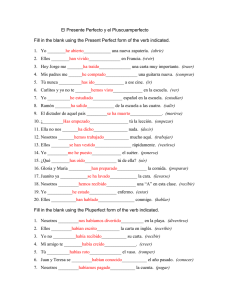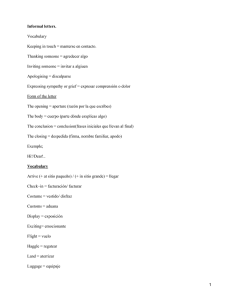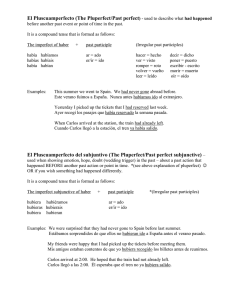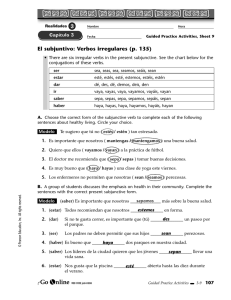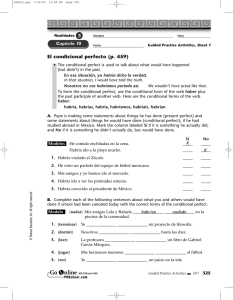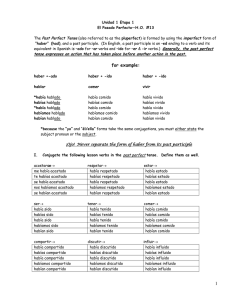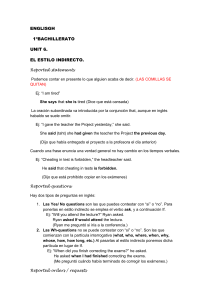El pluscuamperfecto (p. 217) había mentido
Anuncio
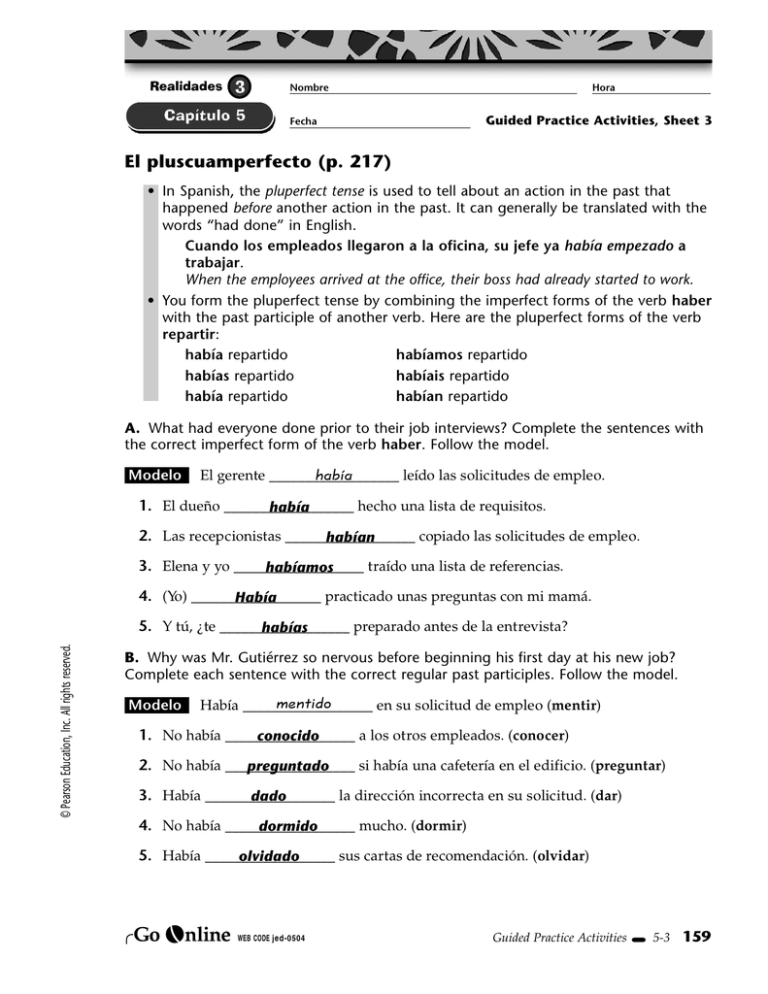
Realidades Nombre Fecha Hora Guided Practice Activities, Sheet 3 El pluscuamperfecto (p. 217) • In Spanish, the pluperfect tense is used to tell about an action in the past that happened before another action in the past. It can generally be translated with the words “had done” in English. Cuando los empleados llegaron a la oficina, su jefe ya había empezado a trabajar. When the employees arrived at the office, their boss had already started to work. • You form the pluperfect tense by combining the imperfect forms of the verb haber with the past participle of another verb. Here are the pluperfect forms of the verb repartir: había repartido habíamos repartido habías repartido habíais repartido había repartido habían repartido A. What had everyone done prior to their job interviews? Complete the sentences with the correct imperfect form of the verb haber. Follow the model. Modelo: había El gerente __________________ leído las solicitudes de empleo. 1. El dueño __________________ hecho una lista de requisitos. había 2. Las recepcionistas __________________ copiado las solicitudes de empleo. habían 3. Elena y yo __________________ traído una lista de referencias. habíamos 4. (Yo) __________________ practicado unas preguntas con mi mamá. Había © Pearson Education, Inc. All rights reserved. 5. Y tú, ¿te __________________ preparado antes de la entrevista? habías B. Why was Mr. Gutiérrez so nervous before beginning his first day at his new job? Complete each sentence with the correct regular past participles. Follow the model. Modelo: mentido Había __________________ en su solicitud de empleo (mentir) 1. No había __________________ a los otros empleados. (conocer) conocido 2. No había __________________ si había una cafetería en el edificio. (preguntar) preguntado 3. Había __________________ la dirección incorrecta en su solicitud. (dar) dado 4. No había __________________ mucho. (dormir) dormido 5. Había __________________ sus cartas de recomendación. (olvidar) olvidado WEB CODE jed- 0504 Guided Practice Activities 5-3 159 Realidades Nombre Hora Guided Practice Activities, Sheet 4 Fecha C. Complete each sentence with the pluperfect tense of the verb in parentheses to tell what people had done before their first day of work. Follow the model. ¡Cuidado! Some past participles require an accent mark and some have completely irregular forms. Modelo: (escribir) Carlos __________ en una tarjeta todo lo que había ________________ escrito quería recordar. 1. (oír) Nosotros ____________ muchos comentarios positivos habíamos ________________ oído sobre la compañía. 2. (poner) Yo ____________ ________________ unos bolígrafos y un calendario en mi había puesto mochila. 3. (leer) Todos los nuevos empleados ____________ el manual de habían ________________ leído trabajo. 4. (decir) La jefa de la compañía ____________ ________________ “Bienvenidos a había dicho nuestra oficina.” 5. (sonreír) Tú ____________ la entrevista. habías ________________durante sonreído D. Based on the pictures, tell what each person had done before leaving for work. You can use the verbs in the word bank to help you describe the actions. ¡Cuidado! Reflexive pronouns, object pronouns, and negative words go in front of the conjugated form of haber in the pluperfect. levantarse lavarse afeitarse cepillarse ponerse Marta ______ ________________ el pelo. se ________________ había secado 1. Los gemelos ______ ________________ ________________ los dientes. se habían cepillado 2. Lópe ______ ________________ ________________ temprano. se había levantado 3. me ________________ había puesto Yo ______ ________________ la camisa. 4. Tú ______ ________________ ________________. te habías afeitado 5. nos ________________ habíamos lavado Nosotros ______ ________________ las manos. 160 Guided Practice Activities 5-4 WEB CODE jed- 0504 © Pearson Education, Inc. All rights reserved. Modelo: secarse
